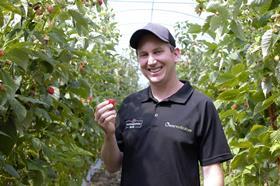
New Zealand’s Northland region is set to become a hub for hydroponic horticulture.
Local grower Maungatapere Berries has secured a NZ$2.37m Provincial Growth Fund (PGF) partnership to set-up the country’s first centre for hydroponics growing excellence.
Announced by New Zealand’s minister of regional economic development Shane Jones today (12 July), the partnership will enable Maungatapere Berries to develop the first phase of a high-tech education, training and employment operation, as part of a 20ha hydroponic orchard expansion. The expansion will see the company doule its workforce to 360 employees over the next eight years.
“Our plan, as part of the PGF partnership, is to further build on the extensive work the family’s business has already undertaken in hydroponics providing permanent employment opportunities for locals in horticulture,” said Patrick Malley, director of Maungatapere Berries.
“We aim to use it as a template designed to create better paying jobs and lifelong careers for young Northlanders as well as improving the social and economic benefits for local communities.”
Owned and operated by the Malley family, Maungatapere Berries started developing part of its 37ha kiwifruit orchard into a hydroponic berry operation four years ago, focusing on growing high quality fruit to supply the New Zealand domestic market.
The company have continued investing and expanding their operation, which employs 45 full-time staff and an additional 180 staff during the peak season, and includes an advanced packhouse servicing the domestic market, with future plans to export.
“Ongoing research into new fruit crops combined with greenhouse innovation and a strategy to build deep capability has the potential to develop a large environmentally sustainable horticultural industry that supports real growth in living wage employment and social equality for Northland,” Malley said.
“Protected cropping of fruit and vegetable crops, grown under covers and using hydroponic feeding systems is a fast-growing part of the horticultural industry producing high-value crops, without negatively impacting the local climatic and environment, which also require a large stable skilled labour force.”



